Chapter 7 Bankruptcy Florida: Reclaim Financial Freedom

When overwhelming debt threatens Florida residents, Chapter 7 bankruptcy Florida offers a legal pathway to eliminate unsecured obligations and achieve lasting relief. This definitive guide clarifies Florida’s unique bankruptcy landscape—from homestead exemptions shielding your home to strategic eligibility planning—while debunking common myths. Whether you’re in Miami facing medical bills, Tampa struggling with credit cards, or Orlando recovering from job loss, understanding Chapter 7’s mechanics empowers informed financial decisions during crises.
Core Advantages of Chapter 7 Bankruptcy Florida
Unlike multi-year repayment plans, Chapter 7 bankruptcy Florida discharges qualifying debts within 4–6 months through federal court oversight. Critically, Florida’s generous exemption laws protect essential assets, enabling most filers to retain homes, vehicles, and retirement accounts. Key outcomes include:
- Automatic Stay Activation: Immediate halt to creditor calls, lawsuits, and foreclosures upon filing.
- Debt Discharge: Permanent elimination of unsecured debts like credit cards and medical bills.
- Asset Preservation: Strategic use of Florida-specific exemptions to safeguard property.
- Financial Reset: Faster credit recovery compared to perpetual debt cycles.
Florida Distinction: While federal bankruptcy law applies nationally, Florida’s state-specific exemptions—particularly homestead protections—deliver superior outcomes versus other states.

Comprehensive Florida Exemptions: Protecting Your Assets
Homestead Exemption: Your Home Fortress
Florida’s constitutional shield (Article X, Section 4) provides unlimited equity protection for primary residences on parcels up to:
- ½ acre in urban municipalities
- 160 acres in rural counties
Practical applications:
- A Palm Beach homeowner with $1.2M equity faces no forced sale.
- Conversely, New York caps homestead exemptions at $179,950.
- Essential timing rule: Property must be owned 1,215+ days pre-filing for full protection.
Vehicle Exemption: Safeguarding Transportation
Florida Statute 222.25 allows $1,000 per filer in vehicle equity. Strategically, married couples combine exemptions to protect $2,000.
- Example: A truck worth $15,000 with a $14,000 loan leaves $1,000 equity—fully exempt.
Personal Property Protections
Florida’s tiered system covers:
- Household Goods: $1,000 per item (no total limit)
- Jewelry: $1,000 aggregate value
- Professional Tools: $2,000 for work equipment
- Wildcard: $4,000 for any unprotected assets
Unbreakable Asset Shields
Florida law exceptionally safeguards:
- 100% of wages in bank accounts (when traceable to earnings)
- Unlimited retirement funds (IRAs, 401(k)s, pensions)
- Prepaid tuition plans (Florida 529 accounts)
- Disability/Social Security benefits
Legal Reference: Florida Statutes Chapter 222
Qualifying for Chapter 7 Bankruptcy Florida
Navigating the Florida Means Test
Your household income must fall below 2024 state medians:
| Household Size | Annual Income Limit |
|---|---|
| 1 person | $64,317 |
| 2 people | $78,557 |
| 3 people | $89,722 |
| 4 people | $102,899 |
| Each additional person | +$9,900 |
Calculation nuances:
- Income sources: Wages, business income, unemployment, rental earnings.
- Allowable deductions: Mortgages, car payments, childcare, taxes.
- Above-median filers: May still qualify through expense adjustments.
Non-Income Eligibility Factors
- Prior bankruptcies: Previous Chapter 7 discharge within 8 years disqualifies applicants.
- Credit counseling: Mandatory state-approved course completion.
- Fraud prevention: Recent luxury purchases trigger audits.

The Chapter 7 Process: Step-by-Step Timeline
Pre-Filing Preparation (1–4 Weeks)
Initially, your attorney will:
- Assess debts: Determine dischargeability of obligations.
- Coordinate credit counseling: Required 90-minute course.
- Develop exemption strategy: Maximize asset protection.
- Compile documents: Tax returns, pay stubs, property deeds.
Filing & Automatic Stay Implementation
Upon submission:
- Court filing: Attorney electronically submits petition ($338 fee).
- Creditor freeze: Lawsuits and garnishments halt immediately.
- Trustee assignment: Court appoints case administrator.
The 341 Meeting: Key Proceedings
Typically occurring 4-8 weeks post-filing:
- Virtual hearing: Conducted via Zoom (10-15 minutes).
- Trustee verification: Confirms ID and petition accuracy.
- Creditor participation: Rare except in complex cases.
Post-Meeting Procedures
Before discharge:
- Trustee asset review: Non-exempt property liquidation (rare in Florida).
- Financial management course: Second mandatory requirement.
- Creditor objections: 60-day window to challenge discharges.
Debt Discharge Completion
Final phase outcomes:
- Court order: Erases qualifying debts 90 days post-341 meeting.
- Surviving obligations: Child support, student loans, recent taxes.
Florida Success Rate: 96% of Chapter 7 cases end in discharge (U.S. Courts).
Cost Analysis: Chapter 7 Bankruptcy Florida
Attorney Fee Structures
| Experience Level | Typical Cost | Service Scope |
|---|---|---|
| Standard Case | $1,200-$1,800 | Standard exemption planning |
| Complex Assets | $2,000-$2,500 | Business interests, multiple properties |
| Pro Bono | $0 | Income-qualified through legal aid |
Additional Expenses
- Court filing fee: $338 (waivable for incomes <150% poverty line)
- Credit courses: $50-$100 total for both required courses
- Document retrieval: $0-$300 for certified records

Florida-Specific Challenges & Solutions
Homestead Protection Risks
Common pitfall: Transferring assets into home equity pre-filing.
Solution: Trustees can “claw back” transactions within 2 years. Therefore, consult attorneys before asset transfers.
Wage Garnishment Complexities
Florida statute: Requires garnishment cessation post-filing. However, pre-filing seizures face recovery limitations:
- Trustees can reclaim funds garnished within 90 days of bankruptcy.
Tax Refund Management
Strategic approaches:
- Pre-filing expenditure: Use refunds for necessities like car repairs.
- Timing adjustment: File bankruptcy before refund issuance.
Chapter 7 Alternatives: Comparative Analysis
Chapter 13 Bankruptcy
Preferable when:
- Non-exempt assets exist (e.g., vacation property)
- Mortgage arrears require repayment
- Income exceeds means test thresholds
Debt Settlement Dangers
Florida-specific risks:
- Section 559.72: Allows lawsuits during negotiations
- Tax implications: Forgiven debt over $600 is taxable
- Credit damage: Similar impact to bankruptcy
Non-Bankruptcy Options
- Hardship programs: Lender modifications for medical crises
- Debt management plans: Licensed credit counseling
Selecting Your Florida Bankruptcy Attorney
5 Essential Credentials
- Board Certification: Florida Bar Bankruptcy Specialization
- Local Court Experience: Knowledge of district trustees
- Transparent Pricing: Flat fees in writing
- Post-Discharge Support: Credit rebuilding guidance
- Documented Reviews: AVVO/Better Business Bureau A+ ratings
Critical Red Flags
- Bankruptcy mills: Paralegal-driven high-volume firms
- Discharge guarantees: Violates Florida Bar ethics rules
- Encouraging new debt: Triggers fraud allegations
Post-Bankruptcy Credit Recovery
Rebuilding Timeline
- Month 1: Secure credit-builder card ($200 deposit)
- Month 4: Obtain secured installment loan
- Month 12: Qualify for FHA mortgage
Florida advantages:
- Credit scores typically rebound to 650+ within 18 months
- No state income tax accelerates savings

Action Plan: Your Chapter 7 Roadmap
- Determine eligibility: Use U.S. Trustee’s Means Test Calculator
- Document creditor abuse: Track violations under FCCPA
- Consult attorneys: Schedule free case evaluations
- Time filing strategically: Avoid tax refund seasons
Delay consequences:
- Lawsuits converting to non-dischargeable judgments
- Wage garnishments seizing 25% of income
- Foreclosure auctions in 90+ days
Act now: Connect via Florida Bar Lawyer Referral Service or use our Exemption Calculator.
FAQ: Chapter 7 Bankruptcy Florida
Q1: Can I keep my car through Chapter 7 bankruptcy Florida?
A: Typically yes. Florida’s $1,000 vehicle exemption protects most vehicles. Furthermore, if your loan balance exceeds the car’s value, trustees avoid liquidation. Consequently, reaffirming loans preserves vehicles while discharging other debts.
Q2: How long does Chapter 7 bankruptcy impact credit reports?
A: 10 years from filing date. Nevertheless, its influence diminishes significantly after 24 months. Moreover, discharged debts show $0 balances, improving debt-to-income ratios immediately. Thus, most Floridians qualify for mortgages within 2-4 years.
Q3: Are retirement accounts vulnerable in Florida Chapter 7 cases?
A: Completely protected. Florida Statute 222.21 shields 401(k)s, IRAs, and pensions without limits. Additionally, ongoing contributions remain exempt during bankruptcy. Therefore, Florida offers superior retirement protection versus federal exemptions.
Q4: Is self-filing Chapter 7 bankruptcy Florida advisable?
A: Legally permissible but risky. Florida’s exemption system requires precise asset titling. One error may forfeit homestead rights. Furthermore, 94% of pro se filings face dismissal versus 2% of attorney-managed cases (Middle District FL).
Q5: What obligations survive Chapter 7 discharge?
A: Non-dischargeable debts include: child support, alimony, most student loans, recent taxes, and court fines. Additionally, fraud-related debts may persist if creditors object within deadlines.
Q6: How does Florida’s homestead exemption interact with bankruptcy?
A: It protects unlimited equity for primary residences owned 1,215+ days pre-filing. Properties under ½ acre (urban) or 160 acres (rural) qualify. However, new residents face federal caps ($189,050) if homesteaded <3.3 years.
Q7: Can unemployed Floridians file Chapter 7 bankruptcy?
A: Yes—often advantageously. Unemployment income automatically qualifies under means testing. Essential note: Include all income sources. Meanwhile, savings remain protected via Florida’s $4,000 wildcard exemption.